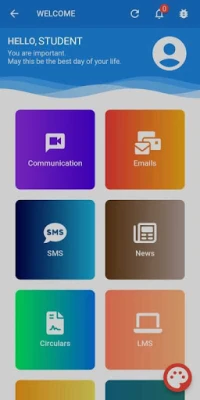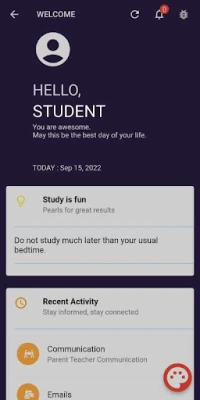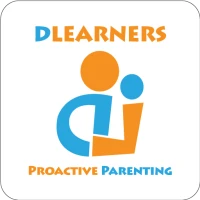
Latest Version
1.0.2
August 18, 2025
ETHDC Technologies
Education
Android
0
Free
com.ethdc.iisauh
Report a Problem
More About International Indian School
Enhancing School Communication: A Comprehensive Guide
Effective communication within a school environment is crucial for fostering a collaborative atmosphere among students, parents, and educators. This article explores various channels of communication, including email, circulars, news updates, notifications, homework assignments, transport information, timetables, and parent-teacher interactions. By understanding these elements, schools can enhance their communication strategies and ensure that all stakeholders are well-informed.
Email Communication: The Backbone of School Correspondence
Email communication serves as a vital tool for schools to connect with parents, students, and staff. It allows for quick dissemination of information, ensuring that everyone stays updated on important matters. Schools can utilize email for:
- Announcements: Share important news and updates regarding school events, policies, and changes.
- Reminders: Send timely reminders about upcoming deadlines, meetings, and activities.
- Feedback: Encourage parents and students to provide feedback on school initiatives and programs.
Circulars: Formal Communication for Important Notices
Circulars are formal documents that schools use to communicate important information to parents and students. These can include:
- Policy Changes: Informing stakeholders about changes in school policies or procedures.
- Event Notifications: Announcing upcoming events such as parent-teacher meetings, sports days, and cultural programs.
- Health and Safety Guidelines: Providing essential information regarding health protocols and safety measures.
News Updates: Keeping Everyone Informed
Regular news updates are essential for maintaining transparency and keeping the school community informed. Schools can publish newsletters or maintain a dedicated section on their website to share:
- Achievements: Highlighting student and staff accomplishments, awards, and recognitions.
- Upcoming Events: Providing details about future events and activities.
- Community Involvement: Showcasing partnerships with local organizations and community service initiatives.
Notifications: Instant Updates for Immediate Attention
Notifications are crucial for conveying urgent information that requires immediate attention. Schools can utilize various platforms to send notifications, including:
- Mobile Apps: Many schools now use mobile applications to send push notifications about emergencies, schedule changes, or important reminders.
- SMS Alerts: Text message alerts can quickly inform parents and students about last-minute changes or emergencies.
Homework and Assignments: Streamlining Academic Communication
Clear communication regarding homework and assignments is essential for student success. Schools can enhance this process by:
- Online Portals: Utilizing online platforms where teachers can post assignments, due dates, and resources for students and parents to access easily.
- Regular Updates: Sending weekly or bi-weekly emails summarizing homework assignments and upcoming projects.
Transport Information: Ensuring Safe and Reliable Travel
Transport communication is vital for ensuring that students arrive at school safely and on time. Schools can improve transport communication by:
- Bus Schedules: Providing clear and accessible bus schedules to parents and students.
- Real-Time Updates: Implementing systems that notify parents of any delays or changes in transport arrangements.
Timetable: Clarity in Academic Scheduling
A well-structured timetable is essential for effective learning. Schools should ensure that timetables are:
- Accessible: Making timetables available online and in print for easy access by students and parents.
- Updated: Regularly updating timetables to reflect any changes in class schedules or teacher assignments.
Parent-Teacher Communication: Building Strong Relationships
Effective parent-teacher communication is key to student success. Schools can foster this relationship by:
- Regular Meetings: Organizing parent-teacher conferences to discuss student progress and address concerns.
- Open Channels: Encouraging parents to reach out via email or phone for any questions or feedback.
- Workshops: Hosting workshops for parents to understand the curriculum and how they can support their children’s learning at home.
Conclusion: The Importance of Comprehensive Communication
In conclusion, effective communication within a school setting is essential for fostering a positive and productive environment. By utilizing various channels such as email, circulars, news updates, notifications, and more, schools can ensure that all stakeholders are informed and engaged. Prioritizing clear and consistent communication not only enhances the educational experience but also strengthens the community as a whole.
Rate the App
User Reviews
Popular Apps










Editor's Choice




























